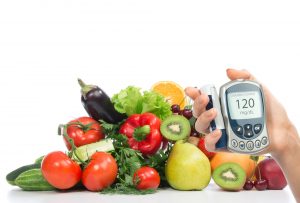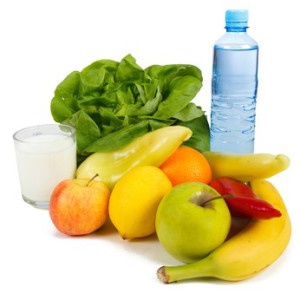What Diet Is Best For Reducing Your Risk Of Diabetes?
 I don’t need to tell you that nutrition is confusing. The headlines change day to day. One day antioxidants are good for you. The next day they are worthless. What are you to believe?
I don’t need to tell you that nutrition is confusing. The headlines change day to day. One day antioxidants are good for you. The next day they are worthless. What are you to believe?
That is why I knew you would be skeptical when you saw recent headlines saying things like, “Antioxidants reduce your risk of diabetes” or “An antioxidant-rich diet may prevent diabetes”. You are probably waiting for the other shoe to drop.
You are waiting for the next headline telling you to ignore the previous headlines.
That is why I decided to analyze the study (FM Mancini et al, Diabetologia, 61: 308-316, 2018) behind the headlines and tell you whether the headlines were true or false. More importantly, I wanted to put the study into perspective so you could apply the findings to your life.
How Was The Study Done?
 The data for this paper came from the Interaction of Genetic and Lifestyle Factors on the Incidence of Type 2 Diabetes (InterAct) study. French women born between 1925 and 1950 were enrolled in the study beginning in 1990.
The data for this paper came from the Interaction of Genetic and Lifestyle Factors on the Incidence of Type 2 Diabetes (InterAct) study. French women born between 1925 and 1950 were enrolled in the study beginning in 1990.
Women were excluded from the study if they had pre-existing cardiovascular disease, diabetes, or cancer.
In June of 1993 a very extensive dietary questionnaire was mailed to all participants. The antioxidant capacity of each of the foods in the diet was estimated using an existing database, and the total antioxidant content of each woman’s diet was calculated.
A total of 64,223 women (average age = 52) completed the questionnaire and were followed for 15 years. During that time 1751 of the women developed type 2 diabetes.
The study correlated the total antioxidant content of the diet with the risk of developing type 2 diabetes. Coffee was excluded from the analysis because the antioxidants found in coffee are high molecular weight compounds, and it is not clear how well they are absorbed.
The major sources of antioxidants in the French diet were fruits (23%), vegetables (19%), wine (15%), tea (10%), and chocolate (2%). Whole grains and beans are also good sources of antioxidants, but the French (and Americans) don’t eat enough of them to influence their total antioxidant intake.
In case you were wondering why wine and chocolate were among the five top sources of antioxidants, remember this is the French diet we are talking about.
Do Antioxidants Reduce Diabetes Risk?
 The authors of the study divided the women into 5 groups (quintiles) based on the antioxidant content of their diets. Quintile one had the lowest antioxidant intake, and quintile five had the highest antioxidant intake.
The authors of the study divided the women into 5 groups (quintiles) based on the antioxidant content of their diets. Quintile one had the lowest antioxidant intake, and quintile five had the highest antioxidant intake.
Compared to the women in quintile one (lowest antioxidant intake), the risk of developing type 2 diabetes was decreased by:
- 15% for women in quintile two.
- 30% for women in quintile three.
- 38% for women in quintile four.
- 39% for women in quintile five (highest antioxidant intake).
- As you might guess from the data above, there was an inverse association between total antioxidant content of the diet and type 2 diabetes up until somewhere between the third and fourth quintiles.
- Above that antioxidant level, the relationship between dietary antioxidant content and risk of developing type 2 diabetes plateaued.
The authors concluded, “Our findings suggest that the total antioxidant capacity of the diet may play a role in reducing the risk of type 2 diabetes in middle-aged women. As type 2 diabetes represents a high disease burden worldwide, our results may have important public health implications.”
What Diet Is Best For Reducing Your Risk Of Type 2 Diabetes?
While most of the headlines talked about the effect of antioxidant intake on the risk of developing type 2 diabetes, we need to remember that the study was done with antioxidant-rich foods. That raises 3 important questions.
#1: Is it the antioxidants or the foods that decrease the risk of developing type 2 diabetes?
 This was a diet rich in fruits, vegetables, and tea with moderate amounts of wine and chocolate. Although they didn’t make it to the top 5 in this study, whole grains and beans are also a good source of dietary antioxidants. In short, this was a very healthy diet.
This was a diet rich in fruits, vegetables, and tea with moderate amounts of wine and chocolate. Although they didn’t make it to the top 5 in this study, whole grains and beans are also a good source of dietary antioxidants. In short, this was a very healthy diet.
That represents a complicating factor. For example, fruits and vegetables are also good sources of non-antioxidant phytonutrients that appear to have health benefits. They are also a good source of fiber and the healthy gut bacteria that eat the fiber.
In short, this study shows that healthy foods reduce the risk of developing type 2 diabetes. Since oxidative stress is thought to play a role in the development of diabetes, it is logical that antioxidants in these foods may help prevent diabetes. However, in reality, we don’t know how much of the risk reduction is due to the antioxidant content of the foods and how much is due to other components of the foods.
#2: Is it healthy foods that decrease the risk of type 2 diabetes, or is it due to decreased intake of unhealthy foods?
 The skeptic in me wants to ask, “Is the diabetes risk reduction due to the healthy foods included in the diet or does it derive from the fact that those foods displaced unhealthy foods from the diet?” It is also legitimate to ask whether people who eat healthier foods also followed a healthier lifestyle.
The skeptic in me wants to ask, “Is the diabetes risk reduction due to the healthy foods included in the diet or does it derive from the fact that those foods displaced unhealthy foods from the diet?” It is also legitimate to ask whether people who eat healthier foods also followed a healthier lifestyle.
Fortunately, the data from this study puts those questions to rest. Compared to women in the lowest quintile of antioxidant intake, women in the highest quintile of antioxidants intake from diet:
- Drank more sugar-sweetened and artificially sweetened beverages.
- Ate more processed meat.
- Ate more calories.
- Smoked more.
- Were just as likely to be overweight.
These women were more physically active, but in other ways their diet and lifestyle were no better than women with much less antioxidant intake.
However, we do need to remember that these are French women. Their overall diet and lifestyle is much better than American women. For example, at their worst:
- 30% were overweight or obese compared to >60% for American women.
- Intake of processed meat was less than ½ serving/day.
- Intake of sugar-sweetened beverages was less than 1 ounce/day and intake of artificially sweetened beverages was 1.3 ounces/day.
#3: How much healthy foods do your need to include in your diet to reduce the risk of type 2 diabetes?
 The fact that the beneficial effect of adding antioxidant-rich foods to your diet reduced the risk of developing type 2 diabetes up to a point and then plateaued has important implications. It means you don’t need to be a vegan to reduce your risk of type 2 diabetes. You just need to include enough healthy foods in your diet.
The fact that the beneficial effect of adding antioxidant-rich foods to your diet reduced the risk of developing type 2 diabetes up to a point and then plateaued has important implications. It means you don’t need to be a vegan to reduce your risk of type 2 diabetes. You just need to include enough healthy foods in your diet.
“How much healthy foods”, you might ask. If we look at the point at which the benefit of eating antioxidant-rich foods plateaued in this study, the women were eating:
- 5-6 servings of fresh fruits and vegetables per day.
- 4 cups of tea/day.
- 7 pieces of chocolate/day.
- 1 glass of wine/day.
If you are an American who is consuming less tea, chocolate, and wine than the French, you will probably want to aim for 6 or more servings of fresh fruits and vegetables per day and include whole grains and beans in your diet.
In a previous issue of “Health Tips From the Professor” I reviewed a study that looked at the optimal intake of fruits and vegetables for various other diseases. That study reported:
- 10 servings per day is optimal for reducing the risk of heart disease, stroke, and premature death.
- 6 servings per day is optimal for reducing the risk of cancer.
This study suggests 6 servings of fruits and vegetable per day is likely to also be optimal for reducing the risk of developing type 2 diabetes.
The bad news is that the average American eats one serving of fruit and less than 2 servings of vegetables a day. The good news is that each added serving of fruits and vegetables reduces your risk of disease and premature death. The same is probably true for whole grains and beans, but they weren’t specifically included in these studies.
What About Supplementation?
 Of course, some of you will be tempted to say, “Changing my diet is hard. I’ll just take antioxidant supplements.” Will that work. If we are talking about individual antioxidant supplements, the answer is a clear, “No”. Numerous clinical studies have shown that.
Of course, some of you will be tempted to say, “Changing my diet is hard. I’ll just take antioxidant supplements.” Will that work. If we are talking about individual antioxidant supplements, the answer is a clear, “No”. Numerous clinical studies have shown that.
However, one study looked at a holistic approach to supplementation and found that it significantly decreased the risk of developing type 2 diabetes over a 20-year period. That is encouraging, but you need to know that the people in that study were not just consuming antioxidant supplements. They were also consuming:
- Supplements containing B vitamins, calcium, magnesium, and trace minerals.
- Plant-based protein supplements that replaced some of the animal protein in their diet.
- Omega-3 supplements.
- Probiotic supplements.
So, just as was true for the diet study discussed above, antioxidant supplements may be beneficial in reducing the risk of developing type 2 diabetes. However, it is not possible to separate the benefits of antioxidant supplements from the other supplements included in the study.
The Bottom Line
You may have seen recent headlines claiming, “Antioxidants reduce your risk of diabetes”. The study behind those headlines was actually looking at the effect of antioxidant-rich foods like fruits and vegetables at decreasing the risk of developing type 2 diabetes.
The study did show that increasing the amount of antioxidant-rich foods in your diet decreases your risk of developing type 2 diabetes.
Since oxidative stress is thought to play a role in the development of diabetes, it is logical that antioxidants in those foods may help prevent diabetes. However, in reality we don’t know how much of the risk reduction is due to the antioxidant content of the foods and how much is due to the phytonutrient and fiber content of the foods.
There was an inverse association between total antioxidant content of the diet and type 2 diabetes up until somewhere between the 5 and 6 servings per day of fresh fruits and vegetables. At that point. the beneficial effect of eating antioxidant-rich foods plateaued. Eating 6 servings per day of fresh fruits and vegetables appears to be optimal for reducing the risk of developing type 2 diabetes.
To put that into perspective, a previous study that looked at the optimal intake of fruits and vegetables for various other diseases reported:
- 10 servings per day is optimal for reducing the risk of heart disease, stroke, and premature death.
- 6 servings per day is optimal for reducing the risk of cancer.
The bad news is that the average American eats one serving of fruit and less than 2 servings of vegetables a day. The good news is that each added serving of fruits and vegetables reduces your risk of disease and premature death. The same is probably true for whole grains and beans, but they weren’t specifically included in these two studies.
Of course, if you really wish to prevent or reverse type 2 diabetes, a holistic approach including weight control, exercise, diet, and supplementation is best.
For more details, including a more detailed discussion of supplementation, read the article above.
These statements have not been evaluated by the Food and Drug Administration. This information is not intended to diagnose, treat, cure, or prevent any disease.
Finally, you should also never think of supplementation as a replacement for a healthy diet. If you wish to reduce your risk of developing type 2 diabetes, I recommend a holistic approach that includes weight control, exercise, diet, and supplementation.
